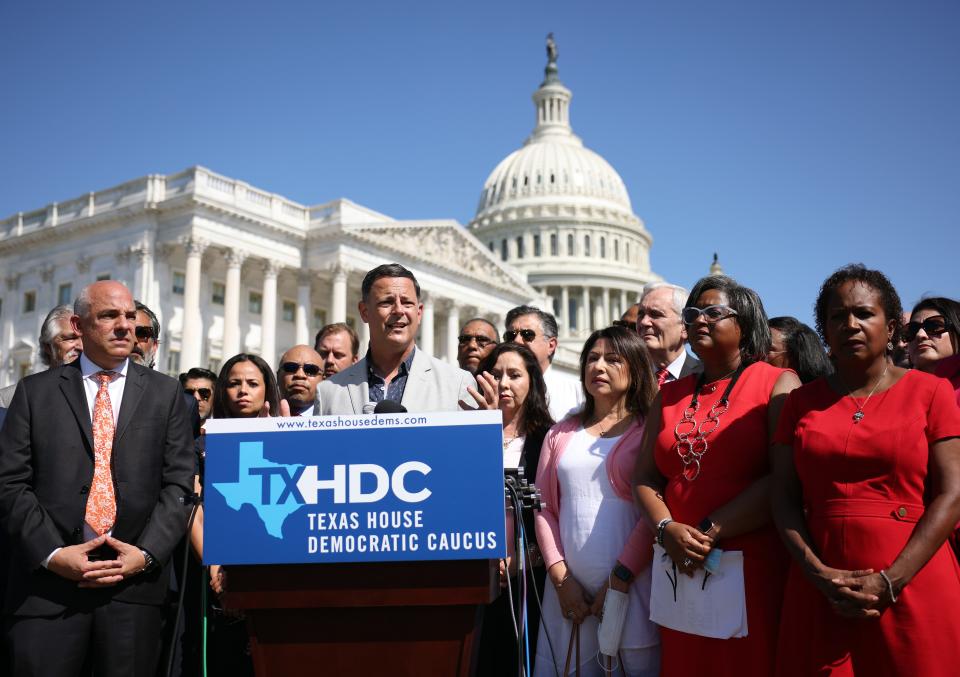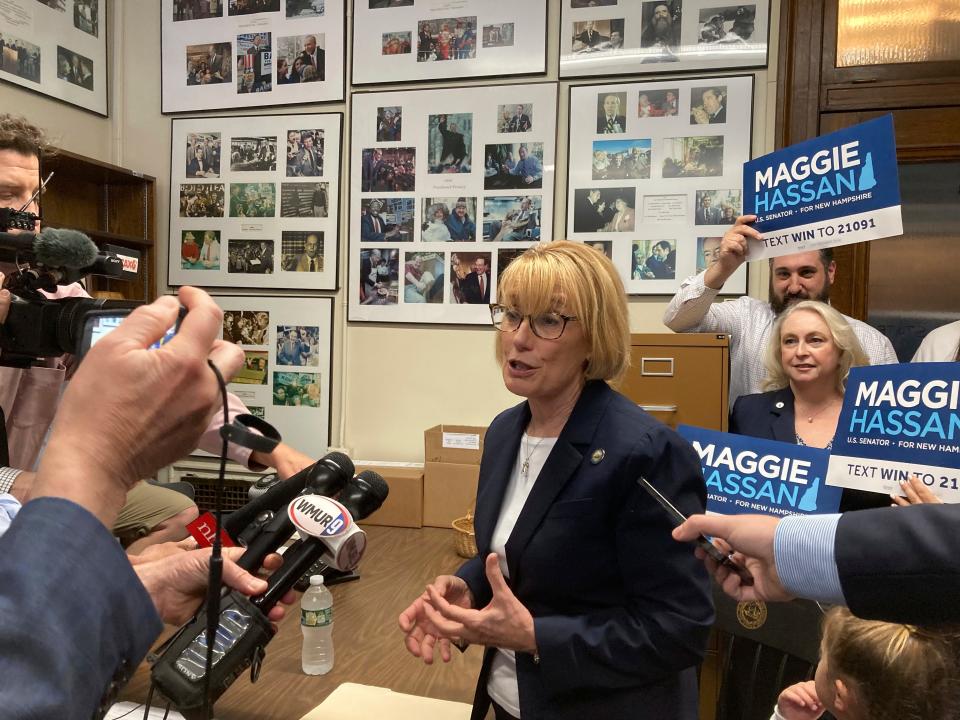Crypto is pouring millions to influence midterm elections. What's the industry trying to achieve?
The cryptocurrency industry has poured millions of dollars into this year's elections as it flexes its newfound wealth – and with it, a measure of rising political influence.
What was once a gimmick and niche field has burst out in the political scene – in election races, campaigning, and lobbying. Campaign contributions connected to the crypto industry have shot up, lobbying efforts have intensified and political campaigns are eyeing the technology behind crypto to woo donors and voters.
“Until 2020, so just two years ago, (crypto) was basically a non-entity in politics,” said Sarah Bryner, director of research and strategy at OpenSecrets, a non-partisan research group that tracks campaign finance. “They really went from zero to 100.”
The industry wants a degree of control over regulations as Washington ponders what to do with the wild west of finance. Crypto exists in a largely unregulated space – which is the point of cryptocurrencies: there is no overarching governing body.
The crypto crash: Bitcoin meant equity for Black, LGBTQ+ investors. Where does the crypto crash leave things?
But at the same time, a steep crash that wiped $300 billion from the crypto market over the last month has prompted calls for regulation from both the industry and Washington. With their future at stake, crypto enterprises want allies in Washington.
“Anytime an industry is being regulated or faces regulations, they are interested in what those regulations are,” said Bryner. “And they typically want them to be minimal.”
The crypto industry has shown extreme interest in what regulations are under consideration. To that end, the number of lobbyists connected to crypto have tripled since 2018 and lobbying spending has quadrupled from $2.2 million to $9 million over that period according to a report from Public Citizen, a non-profit watchdog group.
Aside from trying to influence current lawmakers and the Biden administration, the industry also is pouring millions into political campaigns.
Big crypto contributions
In the 2018 election cycle, donors connected to the industry only spent $500,000, according to OpenSecrets. But in 2020, when crypto started entering the mainstream and amid the explosive growth of its market cap (a measure of an asset's value), contributions jumped to almost $13.5 million total.
Then, in 2021, crypto's market cap hit the $1 trillion mark. Through March 31, the industry has spent $28 million in the 2022 cycle – more than double the entire amount it spent in the 2019-20 cycle..
That's a drop in the bucket compared to the $2 billion in campaign funds raised from all sources this election cycle. But experts say the crypto industry's rapid growth means it's influence in political campaigns and on Capitol Hill is only going to grow.
“It’s an extremely new industry, and that’s because the actual companies themselves are new,” Bryner.
A large majority of contributions have come from one donor, Sam Bankman-Fried, CEO and billionaire founder of crypto exchange FTX. Bankman-Fried, has donated more than $20 million this cycle – or nearly three quarters of the industry's contributions – to crypto-tied Super PACS largely focused on supporting Democratic candidates in this year's midterm elections. He said in a podcast interview he is willing to spend upwards of $1 billion in the 2024 presidential election.

How effective is this money?
But even with the vast amount of cash behind it, crypto’s track record in this year's primary elections has been just as volatile as the market, having extreme highs and lows.
Crypto's future: Bitcoin and other cryptocurrencies are growing up and facing new scrutiny. Will they earn your trust?
A PAC largely funded by Bankman-Fried called Protect our Future put $1 million behind Rep. Shontel Brown in a closely watched Ohio Democratic House primary between Brown and Nina Turner, in an establishment versus progressive rematch. Brown won again this year by close to 27 percentage points.
But in Oregon’s newly created 6th Congressional District, Protect our Future poured $11.4 million in another Democratic primary to support Carrick Flynn, a candidate who had the backing of a PAC aligned with House Speaker Nancy Pelosi, D-Calif.
Oregon State Rep. Andrea Salinas, Flynn's opponent, was quick to criticize the industry's influence saying its money started flowing in during "a time when the cryptocurrency industry seeks to increase its influence in Washington." Salinas later won by 18 percentage points.
Bryner said the crypto industry's youth means it's still figuring out where their money is most effective. So as time progresses, industry chieftains will likely hedge their bets by putting more money toward candidates who they are confident can win, instead of funding candidates purely based on their support of crypto.

“You’ll start to see the giving go more in line with the traditional contributors like banking, manufacturing, and the oil industry. All of these mainstay industries in American politics,” said Bryner.
Kristin Smith, executive director of the Blockchain Association, a crypto advocacy and lobbying group made up of trading platforms and investors, said the industry has put so much money behind Democrats "because we have so many friends that are Republicans.” The money is not only for winning elections, but to build relationships, said Smith.
As the industry starts to age, Bryner says its donations will also look more diverse.
"People think that anything Silicon Valley, anything tech, is going to lean to the left. That does happen a lot in the beginning," said Bryner. “But then they’ll learn how politics in the U.S. works and you’ll start to see them giving a lot more equitably. Sort of to (both) Republicans and Democrats.”
Washington’s sights are set on crypto
Crypto was a trillion dollar industry just a couple of months ago, but a confluence of factors including inflation and waning confidence in the market has sent crypto on a downward spiral.
Smith said the latest crash means more regulation is needed in what has been called the wild west of finance.
“It’s clear if you look at (the crash), we really do need Congress to pass legislation in order to provide an improved regulatory frame for the crypto ecosystem,” said Smith. She says the millions of dollars the industry spends on campaigns is so “Congress will be filled with people who understand crypto.”
Washington already had its sights on the industry when it came to regulation as the industry’s value skyrocketed largely unchecked.
But The target on crypto’s back has grown larger after its latest crash.
The head of the Securities and Exchange Commission, Gary Gensler, has been an outspoken critic of crypto. He has repeatedly issued calls for tighter regulation, out of concern for small investors and its danger to other financial markets.
More: Is cryptocurrency a good investment? I invested thousands and here's why I think it's still wise.
After a House Appropriations meeting on May 18, he told reporters that crypto could “undermine some of the confidence in markets and trust in markets writ large,” according to the Wall Street Journal.
In the Senate, a duo of bipartisan senators have emerged as the architects of crypto-friendly regulation, Sens. Kirsten Gillibrand, D-N.Y., and Cynthia Lummis, R-Wyo. Lummis herself has earned the nickname of “Crypto Queen” on Capitol Hill.
The two recently introduced a bill meant to start a negotiating process regulating the industry. Most importantly, the bill hands regulation to the Commodities Futures Trading Commission rather than the SEC, treating crypto as commodities like wheat and oil rather than securities such as stocks or bonds.
The CFTC is much smaller than the SEC and has fewer resources budget-wise to regulate the industry. Crypto executives and lobbyists publicly lauded the bill – Smith said in a statement that the bill was a “milestone moment.”

Campaign merch on the blockchain
Strategists, crypto enthusiasts and executives are focused on the advantages of blockchain technology.
Blockchain technology puts timestamps on digital assets, from an image online to an amount of a cryptocurrency like Bitcoin. With some clever tricks behind it, that digital timestamp is virtually impossible to fabricate, meaning ownership of a digital asset is 100% verified.
Those strategists and enthusiasts say cryptocurrency and non-fungible tokens (NFT) have advantages that some campaigns and candidates aren’t using yet. NFTs are digital assets that like crypto, use blockchain technology to tie the asset directly to its owner.
“We haven’t seen the extent of what crypto will do to the political landscape yet,” said Ethan Eilon, president of IMGE, a Republican digital marketing firm. But "blockchain technology . . . will have additional utility across campaigns that we haven’t seen before.”
In Arizona, Republican candidate for U.S. Senate, Blake Masters, raised over $550,000 dollars for his campaign from selling 99 NFTs of cover art for his book with tech billionaire Peter Thiel, “Zero to One.” Eilon says the NFTs went beyond just art.
“The utility of the NFT itself was access to events, donor dinners, things like that,” said Eilon. A physical invitation does the same trick, but there's something special about a feeling of exclusivity that an NFT provides, Eilon said. And unlike traditional campaign merchandise, a campaign can change an NFT’s utility as time progresses.

Eilon also said an NFT can provide access to information "that you can't otherwise get. It can incentivize supporters to continue to hold that (NFT) and stay engaged with the campaign.” Essentially, a campaign can repurpose an NFT's benefits to encourage donors to hold on to them.
Mike Nellis, CEO and founder of Authentic, a Democratic digital marketing firm, said there’s a market for NFTs on both sides of the political spectrum.
“I’m confident there’s a segment of political donors who would buy NFTs. It’s not something we’re currently doing, but I can imagine it being an income source for my clients in the future," said Nellis.
"It's easy to see die-hard supporters making donations around a campaign launch to get a limited edition NFT for their favorite Senate candidate," he told USA TODAY.
Charging ahead with the blockchain
Front Row is a group of Democratic strategists who plan to release soon an NFT marketplace for progressive campaigns to use. Like ActBlue and WinRed, fundraising software for political campaigns, they hope Front Row can be another avenue for campaigns to fundraise.
“Basically an NFT is like selling an asset, like a t-shirt, like a coffee mug,” said Parker Butterworth, co-founder of Front Row. “It should work into an overall narrative you want to put out.”
In October 2021, the group's latest and only NFT collection so far, called “The Lone Star Collection,” were digital wanted posters of local Texas Democratic lawmakers who went to D.C. to stall restrictive voting rights legislation, referencing efforts from Texas Republicans to civilly arrest the Democratic lawmakers for refusing to attend a special session. The project, which painted the Democratic lawmakers as Robin Hood-style populist icons, soon sold out.

Butterworth said the group has more collections planned in the future, and despite the declining overall sales volume of NFT’s, they’re still charging ahead.
“With the quote unquote crypto crash, NFT’s didn’t go away. They didn’t get wiped out. NFTs are here to stay,” said Butterworth.
In New Hampshire, Bitcoin enthusiast and former crypto executive Bruce Fenton, is running in what is expected to be a competitive September Republican primary in New Hampshire to challenge Sen. Maggie Hassan, D-N.H., in a race that could determine control of the Senate.
A long-shot political novice up against familiar names to New Hampshire voters, he has marketed himself as a strong pro-bitcoin candidate to the point he asked supporters to buy bitcoin instead of donating to his campaign.
“I think I’m the most serious crypto person from the industry to run for federal office,” said Fenton, describing himself as a “Ron Paul Republican." Paul, a former congressman and the father of Sen. Rand Paul, R-Ky., is known for being a strong libertarian.
“I get a lot of support. People love my message. They love the message of liberty, freedom and peace,” which Fenton says bitcoin can provide.
Bitcoin, like all other cryptocurrency, is decentralized, with no higher authority. To Fenton, decentralization is the pinnacle of liberty. And with liberty, comes freedom and peace, he said.

So far, Fenton’s self-funded $5 million to his campaign and says he’s open to spending more. As a candidate completely new to the campaign trail, he’sd said he hasn’t done enough politicking and needs to garner support from national crypto players.
“I intend to reach out to a lot more people,” said Fenton. “I think it’s a natural fit. If you call yourself a crypto PAC or you’re in the industry, you sort of have to support me.”
But while crypto and blockchain technology might be paraded around as the future of politics and finance by the likes of Front Row and Fenton, Nellis said it’s important to be aware that crypto politics, just like its market, is entirely speculative.
“Maybe crypto is the next big thing. Maybe it’s not. Nobody really knows,” said Nellis. “I’ve been hearing about how email was going to die for 20 years now and email is still one of the biggest sources of online fundraising income for political campaigns.”
This article originally appeared on USA TODAY: The crypto industry is putting its wealth into influencing elections

